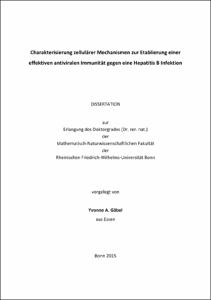Charakterisierung zellulärer Mechanismen zur Etablierung einer effektiven antiviralen Immunität gegen eine Hepatitis B Infektion

Charakterisierung zellulärer Mechanismen zur Etablierung einer effektiven antiviralen Immunität gegen eine Hepatitis B Infektion

| dc.contributor.advisor | Knolle, Percy A. | |
| dc.contributor.author | Gäbel, Yvonne A. | |
| dc.date.accessioned | 2020-04-21T10:44:07Z | |
| dc.date.available | 2020-04-21T10:44:07Z | |
| dc.date.issued | 11.11.2015 | |
| dc.identifier.uri | https://hdl.handle.net/20.500.11811/6562 | |
| dc.description.abstract | Neuesten Schätzungen zufolge gibt es weltweit über 240 Millionen Menschen, welche unter einer chronischen Infektion mit dem Hepatitis B Virus leiden. Es kommt zu einer nicht ausreichenden antiviralen Immunantwort und induziert somit eine Immuntoleranz gegen HBV-spezifische Antigene mit dem klinischen Bild einer chronischen Hepatitis. Diese Patienten bergen ein erhöhtes Risiko für die Entwicklung einer Leberzirrhose und des hepatozellulären Karzinoms. Obwohl eine gut verträgliche prophylaktische HBV-Impfung zur Verfügung steht, gibt es jedoch kaum eine vollständige klinische Ausheilung chronisch HBV-infizierter Patienten. In dieser Arbeit wurde die Rolle von regulatorischen T Zellen (TREG Zellen) während einer persistenten AdHBV-Infektion in der Maus untersucht, welches als Modellsystem der chronischen HBV-Infektion des Menschen dient. Es konnte gezeigt werden, dass TREG Zellen HBV-spezifische B Zellen unterdrücken und die Etablierung einer humoralen Immunantwort verhindern. Werden TREG Zellen depletiert, so können B Zellen eine partielle Immunität gegen HBsAg induzieren. B Zellen sind dann in der Lage anti-HBs Antikörper zu produzieren und führen somit zu einer HBs-spezifischen Serokonversion. Weiterhin ermöglichen B Zellen die Expansion von HBs-spezifischen CD8+ T Zellen, welche nach Differenzierung in CTL und folgender Aktivierung der Effektorfunktionen die Anzahl HBV-infizierter Hepatozyten reduzieren. Dies konnte sowohl im zeitkinetischen Verlauf HBV-spezifischer Serumparameter als auch mittels immunhistochemischer Analyse des Leberparenchyms gezeigt werden. Diese B Zell-vermittelte partielle HBs-spezifische Immunität konnte jedoch weder eine Expansion klärender HBc-spezifischer CTL noch eine vollständige Eliminierung HBV-infizierter Hepatozyten induzieren. Insgesamt zeigen die Ergebnisse erstmals, dass TREG Zellen die Etablierung einer HBs-spezifischen adaptiven T Zell-Antwort in einer B Zell-anhängigen Art supprimieren. Darüber hinaus deuten die Ergebnisse auf die Existenz mindestens einer weiteren Zellpopulation, welche eine klärende und robuste HBc-spezifische T Zell-Antwort inhibiert und zudem unabhängig vom Mechanismus der TREG Zell-vermittelten Inhibition zu agieren scheint. Im Hinblick auf moderne therapeutische Strategien ermöglichen diese Erkenntnisse einen neuen Ansatz zur Optimierung der antiviralen Behandlung chronisch HBV-infizierter Patienten. | en |
| dc.description.abstract | Characterisation of cellular mechanisms for the establishment of an effective antiviral immunity against Hepatitis B infection According to the latest estimations, worldwide there are over 240 million people that suffer from a chronic infection with the Hepatitis B Virus. An insufficient antiviral immune response is mounted and induces thereby an immune tolerance against HBV-specific antigens with the clinical picture of chronic hepatitis. These patients display an increased risk for the development of liver-cirrhosis and hepatocellular carcinoma. Although a well-tolerated prophylactic vaccination against HBV is readily available, there is only rarely a complete clinical recovery of chronically HBV-infected patients. In this study, the role of regulatory T cells (TREG cells) during a persistent AdHBV-infection in mice was analysed, which serves as a model system of chronic HBV-Infection in humans. It could be shown that TREG cells suppress HBV-specific B cells and inhibit the establishment of a humoral immune response. When TREG cells are depleted, B cells are able to induce a partial immunity against HBsAg. B cells are capable of producing neutralising anti-HBs antibodies and thereby induce an HBs-specific seroconversion. Further, B cells enable the expansion of HBs-specific CD8+ T cells, which reduce the number of HBV-infected hepatocytes upon their differentiation into CTL and consequent activation of their effector functions. This could be clearly seen in the time-kinetic analysis of HBV-specific serum parameters as well as in immunohistochemical analysis of liver tissue. This B cell-mediated partial immunity could, however, neither induce the expansion of HBc-specific CTL nor lead to a complete elimination of HBV-infected hepatocytes. Taken together, the presented results show for the first time that TREG cells suppress the establishment of an HBs-specific adaptive T cell response in a B cell-dependent manner. Furthermore, the results indicate the existence of at least another cell population, which inhibits an effective and robust HBc-specific T cell response and additionally seems to act independently of the mechanism of a TREG cell-mediated inhibition. In the context of modern therapeutic strategies, these findings facilitate a new approach for optimising current antiviral treatments for chronically HBV-infected patients. | en |
| dc.language.iso | deu | |
| dc.rights | In Copyright | |
| dc.rights.uri | http://rightsstatements.org/vocab/InC/1.0/ | |
| dc.subject | chronische Hepatitis B | |
| dc.subject | regulatorische T-Zellen | |
| dc.subject | in vivo-Mausmodell | |
| dc.subject | Immunregulation | |
| dc.subject | Leberinfektion | |
| dc.subject | chronic Hepatitis B | |
| dc.subject | regulatory T cells | |
| dc.subject | in vivo mouse modell | |
| dc.subject | immune regulation | |
| dc.subject | liver infection | |
| dc.subject.ddc | 570 Biowissenschaften, Biologie | |
| dc.title | Charakterisierung zellulärer Mechanismen zur Etablierung einer effektiven antiviralen Immunität gegen eine Hepatitis B Infektion | |
| dc.type | Dissertation oder Habilitation | |
| dc.publisher.name | Universitäts- und Landesbibliothek Bonn | |
| dc.publisher.location | Bonn | |
| dc.rights.accessRights | openAccess | |
| dc.identifier.urn | https://nbn-resolving.org/urn:nbn:de:hbz:5n-41923 | |
| ulbbn.pubtype | Erstveröffentlichung | |
| ulbbnediss.affiliation.name | Rheinische Friedrich-Wilhelms-Universität Bonn | |
| ulbbnediss.affiliation.location | Bonn | |
| ulbbnediss.thesis.level | Dissertation | |
| ulbbnediss.dissID | 4192 | |
| ulbbnediss.date.accepted | 06.10.2015 | |
| ulbbnediss.institute | Medizinische Fakultät / Institute : Institut für Experimentelle Immunologie (IEI) | |
| ulbbnediss.fakultaet | Mathematisch-Naturwissenschaftliche Fakultät | |
| dc.contributor.coReferee | Schultze, Joachim L. |
Dateien zu dieser Ressource
Das Dokument erscheint in:
-
E-Dissertationen (4400)




